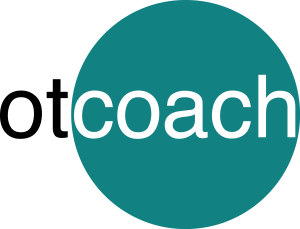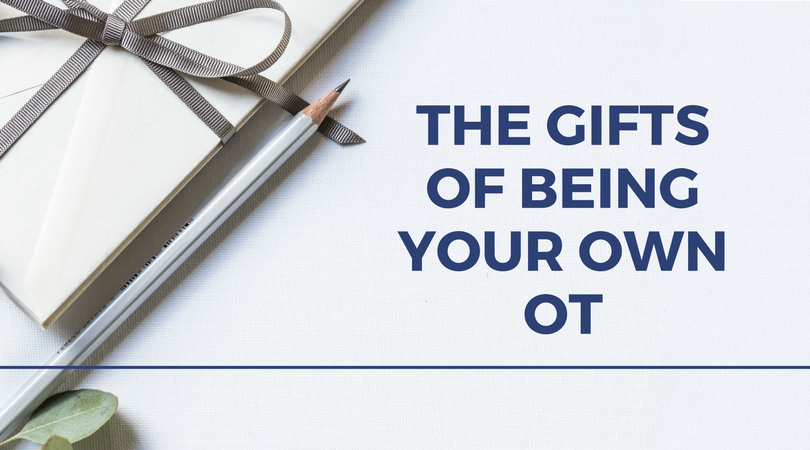Why becoming your own OT could be the best thing you ever do for yourself
(and if you can’t do this alone, perhaps work with an OT who can help you – yes I do mean hire an OT for yourself – you don’t need to have an illness or disability to benefit from the OT approach.)
Go on, grab an assessment from work and do it on yourself! It might be MOHO or perhaps PEO or COPM…or draw yourself a river and KAWArize yourself. See what‘s obvious, acknowledge the advice you want to give yourself and don’t ignore the bits you know need looking at… As you will see, I started with one framework, then moved on to some others…but hey, that’s how I rock and roll.
Taking time for yourself (aka self-care)
Imagine sitting down with someone who focused on you and your life for a change. Imagine them asking you what’s important to you, what’s going well, what’s giving you too much stress. Imagine them helping you think about occupational balance and seeing how perhaps work-life balance might need a tweak. Imagine someone really getting how hard you work and how passionate about your job you are – yes, someone who really gets that! Imagine someone asking you how are managing your well-being – you know that thing that we are good at helping others with! Imagine talking to someone who was an expert in managing long term conditions and who knew exactly what you needed to do…that person is you! Listen, with love, to the advice you would give yourself.
Remembering your passions (aka leisure)
Imagine sitting with someone who took the time to help you remember who you really are, not who you are currently living as. Someone who said “what things did you enjoy as a child?” or “what hobbies really set you on fire nowadays?”. Someone who helped you see how important it was to have your own time, outside of work and family responsibilities. Someone who knew how activities you love, actually help to heal, rejuvenate and reconnect . Imagine someone who actually knew how important purposeful, joyful activities are to life…imagine that eh!
Regaining purpose (work)
Imagine sitting with someone who asked why you became an OT in the first place. Someone who challenged what it means to be an OT and helped you craft your own version of the OT you want to be. Imagine sitting with someone who helped you see through the red tape, forms and annoying bits, so you can sit with your own patients in real connection. Imagine sitting with someone who said “if this isn’t the OT you want, you can change it you know”. Imagine sitting with someone who said “ok then, let’s look at how we can get you back to work/find different work options”. Imagine sitting with someone who says “you know, we know how to manage fatigue/pain/stress etc at work…”. Imagine someone who was accepting of the fact that maybe a change was really, really needed.
Looking around (the physical environment)
It’s very easy to underestimate the effect that our physical environment has on our occupational wellbeing and ability to function with ease and purpose. If you were your own OT right now, what would suggest needs changing in your home or work environment? Are you ignoring the awful seating you have, the bedroom that needs black out blinds so you can sleep better? Would decluttering help? Are you ignoring how difficult it is to work at home on your own, in that cold home office? Is it time to move, or do you intuitively know that you will take your problems with you…? (sorry that is rather a big question!)
Social connection, love and relating (social environment)
If you were your own OT, what would you be saying about your social environment? Are there too many friends, too many people to catch up with? Are there friends who drain you and don’t give you what you need? Are you isolated? Have you been low and withdrawn from social activities and relationships? And how about family relationships? If you were an OT looking in on your own life, what would say? What needs to be tweaked with love?
Roles and Habits (bit of MOHO)
We all have unhelpful habits and take on roles which might need re-evaluating. Your inner OT may say something like this “Habits are the best way to change things…If I get up and meditate/swim/prep dinner, every morning, it will make it easier” and yes, to a certain extent I agree…making something a habit can take away the questioning which can stop us from just doing it, but some of us are just not genetically made for routine… Perhaps there is a way of developing flexible habits? And what does your inner OT say about the roles you inhabit? Do you feel you have any choice in changing them? What is the payoff for keeping the status quo (and there is always a payoff). What might happen elsewhere in your system, if you make this change?
Going with the flow (bit of KAWA)
This really is the bit I think we often forget. What is going really well for you at the moment? What is flowing and happening with ease? How could you play to your strengths as the way to move forward, rather than tackling your weaknesses? How could you focus energy on that tiny chink of light, so it grows? Which of your greatest strengths sometimes turn into your biggest challenges? And “how might your biggest challenges or weaknesses provide the perfect solution or way forward?”
I coach so many OTs and during times that they are most stuck, I always ask “if you were being your own OT right now, what advice would you give yourself” Trust me, the answers always flow. We all have the answers inside us and OT have more than most…



3 comments
Thanks Jen, I enjoyed reading this (& the rest of your website) having stumbled across it after reading the recent article on occupational performance coaching among mothers with children with CP. I was looking to find out more about coaching in OT.
I’m at an interesting point in my life as I’m about to take medical retirement from my job, but what does this mean for me – I can’t stop being an OT, it’s in my DNA! Your articles have helped me to reflect on what happens next for me (I.e. coaching myself) and where I can continue to use an occupational/coaching approach in my other roles and relationships, such as voluntary work, creative pursuits, accompanying people in their spiritual (Christian) walk, family relationships, etc.
I will pop back and read more. For now I need to get out and get some exercise, as I had planned to do this morning (after reading what you’ve said about not sabotaging our own plans!)
Hi Jacquie, yes we never stop being an OT. Perhaps take a look at the online course I have for using coaching as an OT or the book we published with CAOT 🙂
Great article Jen. I’m an OT for decades. Recently retired and became a life coach.
I dedicate myself to coaching OT/PTs and other health professionals. We are naturals at coaching but we can so easily forget about ourselves.
If anyone wants to know more feel free to contact me at emscholnick@gmail.com